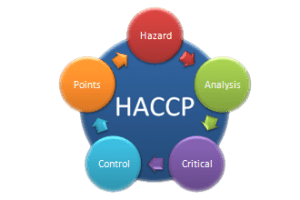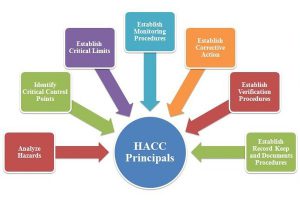AKAP Accreditation Organization

$320.00 – $350.00Price range: $320.00 through $350.00


Further details
This standard is used to manage food safety risks. The HACCP system lets you identify risks and create controls to manage them in your supply chain. The standard includes the Codex Alimentarius Commission (CAC) requirements set by the World Health Organization and the United Nations Food and Agriculture Organization to integrate international food standards, guidelines, and regulations for doing business. This standard can be used to support standard management requirements, such as ISO 22000 (Food Safety Management).
Hazard Analysis and Critical Control Points (HACCP) instantly demonstrates to customers your commitment to producing or trading in safe food. This evidence-based approach can be particularly beneficial when you are subjected to inspection by regulatory authorities or stakeholders.
This can be used by any organization directly or indirectly involved in the food chain including food service providers (canteens, restaurants, fast food chains, caterers, hospitals, hotels, etc.), farms, fisheries, dairies, processors of food for both human and livestock consumption and supporting services such as transporters and distributors.
Organizations that implement HACCP must comply with GMP, Good Manufacturing Practices, as they are a mandatory requirement included within the HACCP (Hazard Analysis and Critical Control Points) standard. However, it is possible to certify each individually.
Benefits of HACCP (Hazard Analysis and Critical Control Points):
-Implement risk control and food safety internationally
-Building trust in controls for manufacturers, shareholders, and suppliers
-Align HACCP with ISO 22000 to improve food safety management systems
-Effective management of food safety risks in the supply chain
-Continuously review and improve your system to maintain its efficiency
-Improve product safety
-Appropriate prevention methods
-Understanding ways to improve the production process
-Increase product quality and stability
-Reduce the cost of the final product test
-waste reduction
-Increase monitoring
-Less need for technical resources
-Increase staff responsibility
-Increase consumer confidence
-Increase market share
-Presence in international markets
-Increasing business stability and security
-Increase staff performance
Obtaining a HACCP (Hazard Analysis and Critical Control Points) means that the organization or company concerned has accepted an international agreement that deals with risk analysis and control of critical points of the food safety system.The food safety certificate will be microbiologically analyzed and the entire food safety risk will be eliminated.
In addition to the primary objective of food safety, HACCP can:

Benefits of ISO implementation:
– Increase customer and consumer confidence
– Increasing the quality of products/services
– Reduce waste and losses in products/services and ultimately reduce costs
– Save on consumables and increase profits
– Planning, implementation of affairs in the form of a predefined international system
– Improve performance, increase productivity and speed in affairs
– Increase efficiency and customer satisfaction
– Reducing the number of complaints
– Improvement and uniformity in the quality of products/services
– Timely delivery of products/services
– Global competition
– Prevent or reduce unexpected events
– Earning points in tenders, obtaining ranks and grades from government organizations, providing evidence in exports
Other benefits are:
– Advertising use in headers, company site and all advertising matters
– Earn points in selecting sample units
– Reduce waste and waste time
– Creating confidence inside and outside the organization
– Transparency of processes and indicators
– Ensuring that customer needs and expectations are met
– Production of product/service with better quality
– Help with more marketing and sales and create demand
– Increasing the productivity and motivation of human resources
– Correcting errors and preventing their recurrence
– Improving communication within the organization
– Prevention of non-compliant product/service production
– Develop sales methods and provide after-sales service
$420.00 – $460.00Price range: $420.00 through $460.00
$380.00 – $420.00Price range: $380.00 through $420.00
$380.00 – $430.00Price range: $380.00 through $430.00
$500.00 – $530.00Price range: $500.00 through $530.00
$380.00 – $420.00Price range: $380.00 through $420.00